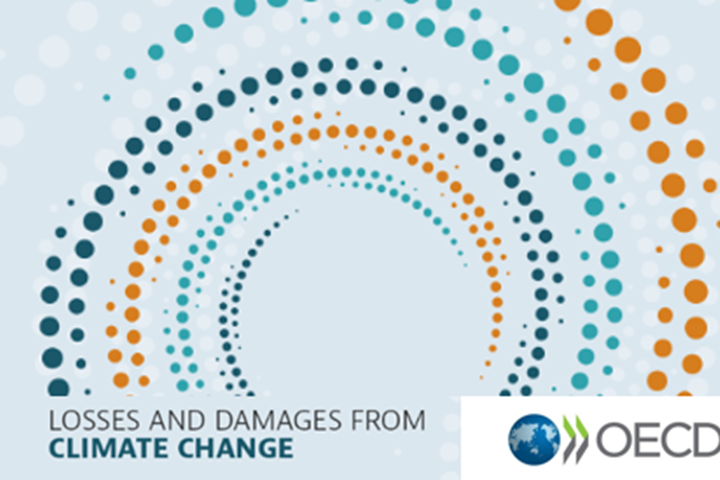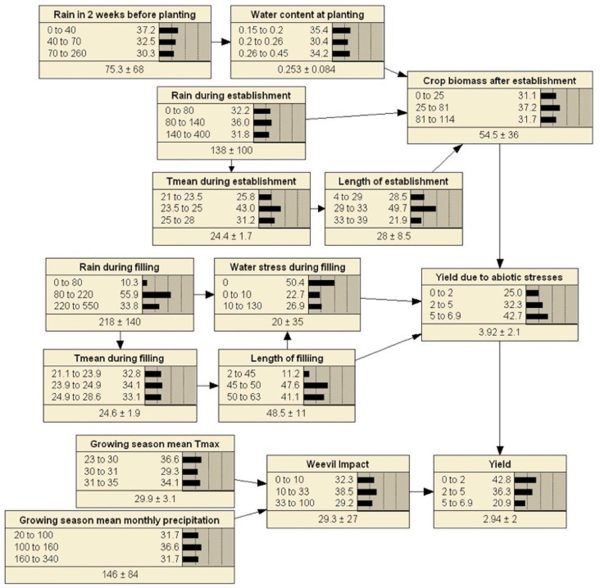
OECD Include Walker work in Report on Managing Climate Risks, Facing up to Losses and Damages 2021
The Walker Institute has contributed a case study on uncertainty and the use of decision-driven approaches in East Africa to an OECD report launched at COP26 in November 2021. Our case study examines approaches to decision-making under uncertainty, focusing on the agricultural sector in Uganda and consideration of approaches to address the drivers of climate risks (hazards, exposure and vulnerability) with regards to livelihoods and well-being. Our team included Dr Lindsay Todman from the School of Agriculture, Policy and Development, and Professor Ted Shepherd from the School of Mathematical, Physical and Computational Sciences (SMPCS).
Overview of the OECD Report
‘Using a medical analogy, scientists have now diagnosed the nature and cause of the “warming disease” and have a good understanding of the prognosis, even if they cannot precisely predict the timing and severity of its effects or how exactly it might interact with other pre-existing conditions, such as extreme poverty or biodiversity loss. These uncertainties are not a reason to delay action. Quite the opposite. Yet the nature of the uncertainties has important implications for how to approach the challenge of reducing and managing the risks. The context for action is also complex and challenging.’
OECD, 2021
The OECD report is principally aimed at policy makers responsible for exploring and assessing potential actions to reduce and manage the risks of losses and damages from climate change. It explores the uncertainties associated with climate risks, and examines in detail the three main types of climate hazard: slow onset changes, extreme weather events and tipping points. It then analyses the policy, financial and technological approaches needed to reduce and manage the risks of losses and damages from climate change. The report draws on experiences from around the world, in particular developing countries and especially Least Developed Countries (LDCs) and Small Island Developing States (SIDS) which are disproportionately affected by the impacts of climate change. It highlights a number of good practices and points to ways forward.
Walker Institute contribution
The Walker Institute case study is drawn from work on filling critical knowledge gaps for improved food security analysis of under researched food crops, focussing on sweet potato. Around 224 million people in sub Saharan Africa – nearly 24% of the population – are under-nourished (FAO 2017). Sweet potato is a mainstay of household food security and a major source of Vitamin A across the region, outranking cassava and maize in importance in 7 countries of East and Central Africa. Any changes in the availability of sweet potato will therefore have a significant impact on people’s health, economic development and living standards. Uganda is the leading producer of sweet potato in Africa and is the focus of the Walker Institute’s on-going research and policy work (see FCFA HyCRISTAL, IDAPS, NIMFRU).
The Bayesian network modelling in the Sweet Potato project became core to the OECD project, enabling us to explore intervention points relating to water stress, temperature, and pest impact, and better understand the risk of crop failure, and its impact on food security and household incomes, under a range of possible future climate conditions.
First, a Bayesian network was developed, representing the interacting impacts of a range of key climate and pest-related factors on overall sweet potato yields:

 Next, the three plausible climate storylines that were developed as part of the HyCRISTAL project were used as inputs to this Bayesian network:
Next, the three plausible climate storylines that were developed as part of the HyCRISTAL project were used as inputs to this Bayesian network:


Passing each climate storyline through the network allowed us to assess the likely impacts of each possible future climate state on sweet potato yields. These yield impacts were, in turn, used as inputs to the livelihood modelling functionality provided by IDAPs, giving an understanding of how these yield changes would ultimately affect the food security and incomes of farmers. By adjusting different parts of the network, a variety of policy interventions (such as improved pest control) could be simulated, and their effects on yields – and ultimately livelihoods – could be analysed.
This process showed that the daily rainfall extremes were less important for sweet potato crop yield than previously thought, and that complete weevil control could mitigate even the most severe anticipated climate impact. Intensifying sweet potato production in place of other crops, such as maize, may therefore be a viable, long term adaptation option.
There are many opportunities to further develop this methodology, such as combining Bayesian networks for multiple crops to better understand the climatic conditions under which a change of crop may be beneficial and incorporating more detailed economic factors such as price changes or the effects of agricultural insurance on people’s livelihoods.
This is a fascinating and very important area of study, and one which we look forward to developing further in 2022 and beyond.
Read the blog posted by the OECD Environment Focus written by our own Dr. Heather Plumpton here: Seeing the value in climate science – Environment Focus (oecd-environment-focus.blog)
